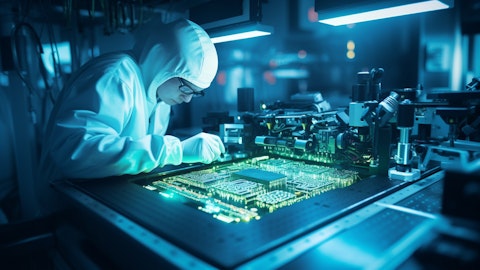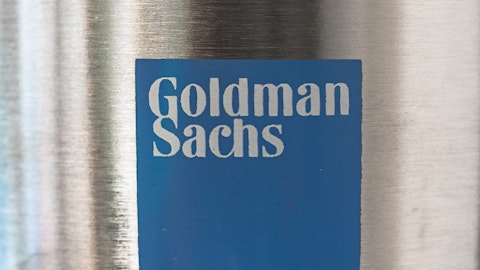We recently compiled a list of the 8 Most Profitable Blue Chip Stocks to Invest In. In this article, we are going to take a look at where Microsoft Corporation (NASDAQ:MSFT) stands against the other profitable blue chip stocks.
The September inflation report came in hotter than expected and showed that it remains sticky. Headline inflation rose by 2.4%, slightly above the anticipated 2.3%, and down from 2.5% in August. Month-over-month, CPI increased by 0.2%, exceeding the forecast of 0.1%.
Core inflation, excluding food and energy, also came in higher than expected at 3.3%, compared to the anticipated 3.2%, marking a slight increase from August. On a monthly basis, core CPI rose by 0.3%, which matched August’s figures but was above expectations of 0.2%.
Following the report, the market is expecting a 25 basis points rate cut to no rate cuts in the upcoming Fed meeting. According to the CME FedWatch tool, 79.9% of interest rate traders expect the rate cuts to be at 450-475 bps at the coming Fed meeting while 20.1% expect the rate cut to stay the same. At the beginning of the month, 32.1% expected a 50 bps rate cut, while 67.9% anticipated a 25 bps cut.
Understanding Inflation Trends and Federal Reserve Strategy
Despite the sticky inflation, IBM’s vice chair, Gary Cohn believes that the Fed will cut rates by 100 bps this year. In an interview at CNBC’s ‘Money Movers’, he suggested that the U.S. is experiencing what a soft landing looks like, with inflation decreasing but not steadily. He indicated that reaching the Fed’s 2% target will be challenging, as inflation rates are likely to fluctuate around this level.
Cohn noted that for the first time in nearly two decades, the Fed is balancing both sides of its dual mandate, employment, and price stability, after focusing primarily on one at a time. He believes the Fed is making the right decisions and is currently in a delicate position as it missed meeting opportunities this year.
Cohn expects that the Fed will implement a total of 100 basis points in rate cuts this year, likely consisting of 25 basis point reductions over the next couple of months. When asked about inflation targets, he expressed a preference for slightly exceeding the target inflation rate, suggesting that a rate of around 2.2% would be more acceptable in a growing economy than undershooting the target.
Cohn also highlighted concerns about geopolitical risks and said that global tensions could lead to inflationary pressures by disrupting supply chains and increasing shipping costs.
Our Methodology
For this article, we use stock screeners to identify nearly 30 stocks above $100 billion market cap and $10 billion TTM net income. Next, we narrowed our list to 8 stocks that had a 5-year net income compound annual growth rate of above 10% and were most widely held by institutional investors. The most profitable blue chip stocks are listed in ascending order of the hedge fund sentiment, which was taken from Insider Monkey’s Q2 database of 912 hedge funds.
Why are we interested in the stocks that hedge funds pile into? The reason is simple: our research has shown that we can outperform the market by imitating the top stock picks of the best hedge funds. Our quarterly newsletter’s strategy selects 14 small-cap and large-cap stocks every quarter and has returned 275% since May 2014, beating its benchmark by 150 percentage points (see more details here).

A development team working together to create the next version of Windows.
Microsoft Corporation (NASDAQ:MSFT)
Market Cap: $3.103 Trillion
5-Year Net Income CAGR: 17.57%
TTM Net Income: $88.136 billion
Number of Hedge Fund Holders: 279
Microsoft Corporation (NASDAQ:MSFT) is one of the pioneers of personal computing and is one of the biggest technology companies in the world. It aims to make digital technology and AI accessible to everyone worldwide.
It offers a wide range of products and services, including cloud solutions, software applications, and hardware devices. Its research and development focus on improving productivity and business processes, building smart cloud and edge platforms, and creating more personalized computing experiences.
Moreover, Microsoft (NASDAQ:MSFT) also maintains data centers to expand capacity for growing AI service demands. Most products are manufactured by third-party contractors, which offers flexibility, though some components rely on a limited number of suppliers, which could disrupt production. Its internal research and development spans several groups, including Cloud and AI, Security, and Gaming, allowing the company to maintain competitive advantages.
Over the last few quarters, the company has taken over a huge part of the AI market and its products are being widely used by other companies. Its tools like Copilots and the Azure OpenAI Service have gained widespread adoption, with 60% of Fortune 500 companies implementing Copilots and 65% using Azure OpenAI Service.
Microsoft (NASDAQ:MSFT) is also one of the best AI datacenter stocks. In 2023, the company increased its AI data center spending by 50%, surpassing Amazon’s 3% decrease. The company partnered with BlackRock to create a $100 billion fund for AI data center growth and pledged over $4 billion for AI infrastructure in Italy. Reports show that Microsoft is set to double its data center capacity to 5 gigawatts this year. It is one of the most profitable blue chip stocks to invest in.
Generation Investment Management stated the following regarding Microsoft Corporation (NASDAQ:MSFT) in its Q2 2024 investor letter:
“Generative AI’s hunger for power has increased disproportionately with its intelligence. According to one estimate, OpenAI’s GPT-4 required 50 gigawatt hours (GWh) of electricity to train, much more than the 1.3 GWh needed for GPT-3.3 And then AI requires even more power when it is put to use (so called ‘inference’). Some of the latest trends worry us. Microsoft Corporation (NASDAQ:MSFT) appears to be slipping in its ESG goals, with its greenhouse gas emissions rising again last year, as it invests in becoming a big player in AI. It is struggling in particular to curb its Scope 3 emissions in the capital goods category – nowhere more so than in the activity associated with the construction of data centres: both the embedded carbon in construction materials like steel and cement, as well as the emissions from the manufacturing of hardware components such as semiconductors, servers and racks. Google’s emissions have risen by close to 50% in the past five years.
We feel it is worth dwelling on Microsoft for a few moments, since we suspect you will be hearing a lot more about the relationship between AI and sustainability in the coming months. The bottom line is that we continue to see Microsoft as a sustainability leader. In the case of Scope 2 emissions, the company covers 100% of its electricity use with purchases of renewable energy. Crucially, though, the majority of this green energy is directly sourced via power purchase agreements, which bring new renewable capacity to the grid. Microsoft is also committed to operating 24/7 on renewable power by 2030, a policy that will help bring energy storage onto the grid as well…” (Click here to read the full text)
Overall MSFT ranks 2nd on our list of the most profitable blue chip stocks to invest in. While we acknowledge the potential of MSFT as an investment, our conviction lies in the belief that AI stocks hold greater promise for delivering higher returns and doing so within a shorter timeframe. If you are looking for an AI stock that is more promising than MSFT but that trades at less than 5 times its earnings, check out our report about the cheapest AI stock.
Read Next: $30 Trillion Opportunity: 15 Best Humanoid Robot Stocks to Buy According to Morgan Stanley and Jim Cramer Says NVIDIA ‘Has Become A Wasteland’.
Disclosure: None. This article is originally published at Insider Monkey.





